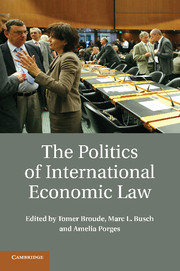Book contents
- Frontmatter
- Contents
- Contributor List
- Acknowledgments
- 1 Introduction
- Part I The Politics of Law Making in International Trade
- 2 The Politics and Indirect Effects of Asymmetrical Bargaining Power in Free Trade Agreements
- 3 The Politics of Linkages in U.S. Preferential Trade Agreements
- 4 The Politics of African Trade Negotiations in the WTO's Doha Round
- 5 The Politics of Legitimacy in the UNCITRAL Working Methods
- Part II The Politics of International Investment Treaty Making
- Part III The Politics of Sovereign Wealth and International Financial Law
- Part IV The Politics of Dispute Settlement in International Economic Law
- Part V Linkages between International Economic Law and Foreign Policy
- Index
3 - The Politics of Linkages in U.S. Preferential Trade Agreements
Published online by Cambridge University Press: 03 May 2011
- Frontmatter
- Contents
- Contributor List
- Acknowledgments
- 1 Introduction
- Part I The Politics of Law Making in International Trade
- 2 The Politics and Indirect Effects of Asymmetrical Bargaining Power in Free Trade Agreements
- 3 The Politics of Linkages in U.S. Preferential Trade Agreements
- 4 The Politics of African Trade Negotiations in the WTO's Doha Round
- 5 The Politics of Legitimacy in the UNCITRAL Working Methods
- Part II The Politics of International Investment Treaty Making
- Part III The Politics of Sovereign Wealth and International Financial Law
- Part IV The Politics of Dispute Settlement in International Economic Law
- Part V Linkages between International Economic Law and Foreign Policy
- Index
Summary
INTRODUCTION
Recent U.S. trade agreements have been characterized by the incorporation of increasingly detailed standards backed up by provision for their enforcement. This trend continued right up to the last days of the Bush Administration, with Democrats insisting on the addition of new, more specific labor and environmental provisions to agreements then before Congress. Under the new Administration there has been no apparent inclination to resile from this approach; if anything, the preference appears to be for “more of the same.” The 2009 President's Trade Policy Agenda states an intention to maintain “strong standards of social accountability” by “[b]uilding on the provisions concerning labor in some of [the United States'] FTAs.” U.S. Trade Representative Ron Kirk more recently has promised a new focus on enforcement, stating in an important speech that “[r]ealizing the potential benefits of trade pacts depends largely on whether we're willing and able to enforce [the negotiated] rules.” This approach, although suggesting a shift in focus, does not seem to imply any fundamental rethinking; for the Administration, the provisions found in past agreements remain a baseline.
It is easy to see the attraction of detailed standards. In the 1980s, frustration with worldwide intellectual property (IP) protection led American policymakers to link the grant of trade benefits to countries' adoption of higher IP standards. This occurred in trade preference systems, then in the WTO negotiations, and, more recently, in bilateral preferential trade agreements (PTAs) – or, as they have been known, free trade or trade promotion agreements.
- Type
- Chapter
- Information
- The Politics of International Economic Law , pp. 40 - 63Publisher: Cambridge University PressPrint publication year: 2011
- 1
- Cited by



